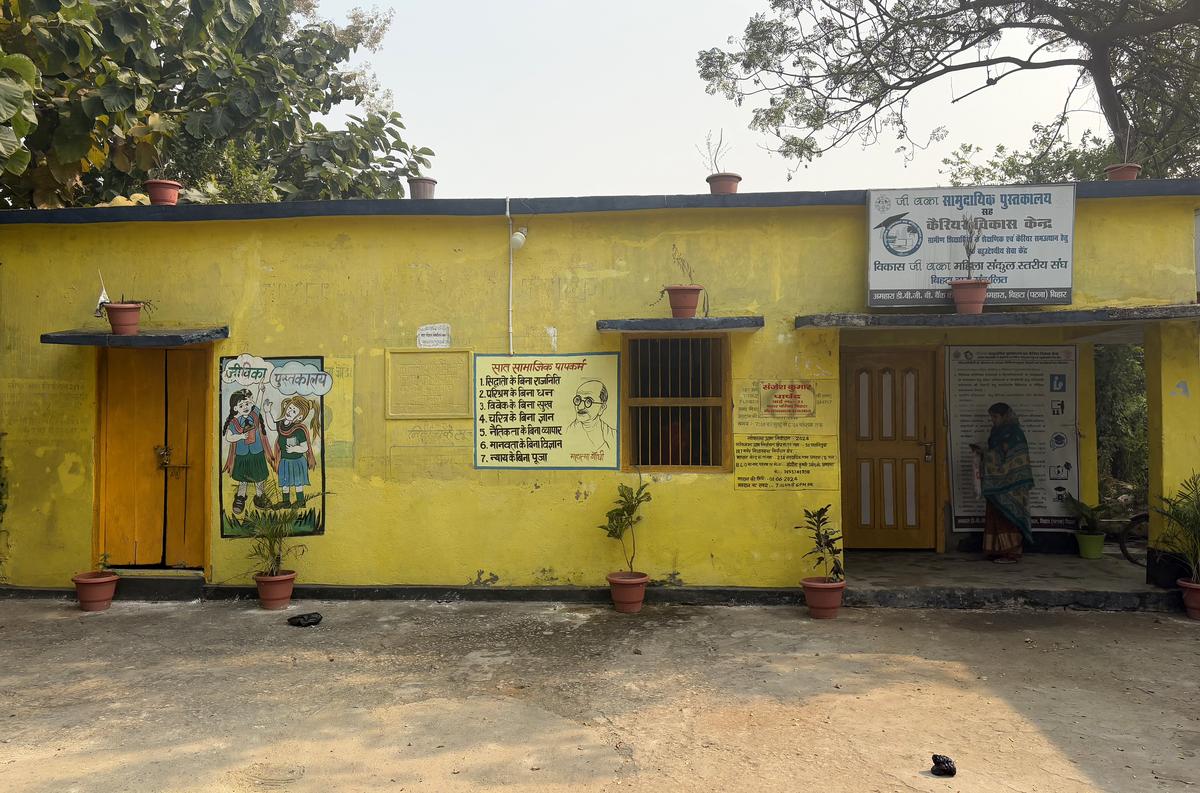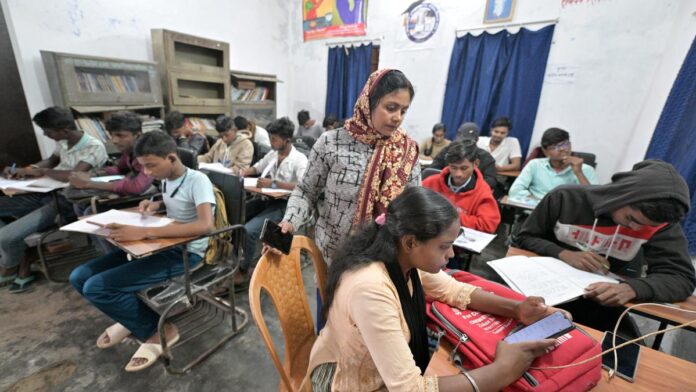Harsh Kumar, 22, is studying for a BTech degree in Gaya College, one of Bihar’s premier institutions. A resident of Amhara village, on the outskirts of Patna, Bihar’s capital, nearly 45 kilometres from the city centre, Kumar’s father is a small farmer, and the family struggles to eke out a living. After he graduated from the government-run Amhara High School, he wanted to work towards a degree in engineering, but there were hardly any books available to crack the Bihar Combined Entrance Competitive Examination for admission to various professional courses. “I simply couldn’t afford the books to study from. If it wasn’t for the Didi ki Library I would not be in this course,” Kumar says.
Started last year by the Bihar government, Community Library and Career Development Centres (CLCDC), across 100 blocks in the State, are known as Didi ki Libraries (roughly translating to a library run by an older sister). The free-of-cost libraries, in 32 districts out of 38, are a boon for children who come from families who cannot afford books. The library offers free internet services and a quiet space for children to study and for the youth to meet and exchange ideas.
Patna district has four such libraries, in Bihta, Khusrupur, Fatuha, and Bakhtiyarpur, all in rural areas. Across Bihar, Didi ki Libraries have a 6,000-strong sitting capacity while the total enrolment is at 1.1 lakh, of which 63% are girls. There is a daily footfall of 60-70 learners, as per JEEViKA, an initiative under the Bihar government’s Rural Development Department, to promote rural livelihood.
The World Bank-supported JEEViKA runs the Didi ki Libraries, with each headed by a Vidya Didi, a dedicated cadre of community workers. The Education Department supports the initiative by providing books.
A village gladdened
Rinku Kumari, 21, graduated in 2024 with a degree in History from Mahant Madhusudan College in Patna. She spends five to six hours in the library every day. “I want to clear the UPSC (Union Public Services Commission) exam, and I cannot afford the tuition fee for a coaching institute,” she says.
Coaching institutes can cost anywhere from ₹5,000 a month. The average farmer’s income in 2021-22 in Bihar was ₹9,252 against the national average of ₹13,661, as per the National Bank for Agriculture and Rural Development.
In Amhara, she finds books that will help her through the entrance exam that at least 10 lakh people from across India write each year, for just a little over 1,000 posts. She admits that the books are limited, but says, “With the WiFi I am able to download free books online.”
The library in Amhara village is painted yellow and has Mahatma Gandhi’s message of avoiding the seven sins, in Hindi. It has three rooms with a seating capacity of 60 at a time and more than 1,200 books on the shelves. Within the rooms are pictures of former president A.P.J. Abdul Kalam and freedom fighter Subhas Chandra Bose, as well as maps of India and the world, a window to possibility. Like most other libraries, it has cubicles, students’ chairs with desk extensions, ceiling fans, power back-up, a water filter, CCTV cameras, and LED screen. They also get two newspapers and magazines each.
Archana Kumari, the Vidya Didi of Amhara library, says, “The moment a form for a competitive exam is published I inform the children and then help them to fill those. We provide printouts as well, so they do not need to go to the city for any work related to form filling.”
She adds that when the library was opened in February 2023, it had 30 children. Now, Amhara has 1,765 registered. Chief Minister Nitish Kumar opened the first library in Madhepura district.
The library is operational eight hours a day, from 9 a.m. to 5 p.m. on weekdays; and during the exams on Sundays as well. The library has both fiction and non-fiction, with textbooks from Classes 8 to 12 of the Bihar Board along with sample answer papers. Children can get books issued, though the preference is for them to read on the site.

A view of the ‘Didi ki Libray’ located in Amhara village, in Patna district.
| Photo Credit:
Amit Bhelari
Some of the most popular books are several that help students learn English, including Word Power Made Easy by Norman Lewis and the Oxford Advanced Learner’s Dictionary. Books like Animal Farm, the political satire by George Orwell, are also popular.
In Hindi, Hamara Samvidhan by Subhash Kashyap and Bharat Ka Swatantrata Sangharsh by a cluster of authors, are well thumbed through. It also has several books for students to prepare for competitive exams for the railways, banking, and National Eligibility-cum-Entrance Test (NEET), among others.
A library in a village in Bihar is usually a distant dream. The State saw a 20.46% dropout rate at the secondary level, the highest across India, in 2021-22. The national average was 12.6%.
According to Archana, many students who frequently visit the library have got admission in Bihar’s top institutes like the Development Management Institute (DMI). Many have graduated with B.Ed degrees that will make them eligible for teachers’ jobs.
Mathura Prasad, 54, who lives in Amhara, says, “Ever since the library has opened, it has changed things for us. Earlier our children would sit at home doing nothing, just listening to family gossip. We cannot afford a separate room for a study.” Most of the children studying in the library walk 5 km to 7 km, to reach; some cycle.
Room to read
These libraries are emerging as a local support system for increasing the participation of rural children and marginalised learners in higher education. They also provide an opportunity for upskilling households connected to self-help groups in their chosen livelihood.
There are 1,408 registered children in Makhdumpur panchayat, Jehanabad district of Bihar. The library functions on the first floor of the Panchayat Bhavan in Kohra village.
Pawan Kumar, 21, a student of Surendra Prasad Yadav College, Gaya, pursuing a BSc degree, says, “We have a joint family of 10 members and it is difficult to study at home. So, I began coming here four months ago. Now, I am a regular. There is no unnecessary chit-chat and the conversations are around studies. The first time I heard the word library was when this space opened.”
Gudiya Kumari, 15, a resident of Makhdumpur village studying in Class 9 in the Government High School, says, “I come here to study and complete my homework. Most of the time something or the other is going on at home. My mother asks me to get involved in home chores, due to which I was sometimes unable to finish my homework. Then the teachers would shout at me.” Here, she finds a quiet environment to work.
Students leave the Didi ki Library, where they do homework and read.
| Photo Credit:
SHASHI SHEKHAR KASHYAP
Social Development Manager (SDM) of Jehanabad district, Faizan Tanveer, says the main objective of such a centre is to develop and promote library culture in rural areas and reading among the underprivileged students. It also aims at addressing issues of child marriage, child labour, and gender-based discrimination, by empowering adolescents, especially girls.
“The Didi ki Library helps identify learners with special needs and provides them with mentoring, guidance, and training support. By connecting adolescents and youth with education and career opportunities, we hope to build local role models,” Tanveer says.
Shabnam Raza, the Vidya Didi of Kohra library, says the digital library is used for webinars, career workshops, skill training, and preparatory courses, for different entrance exams to universities and to competitive exams for jobs.
“We have a collaboration with distance education National Institute of Open Schooling (NIOS) and Indira Gandhi National Open University (IGNOU). So, we offer admission support for students as well,” she says.
The aim is to empower first-generation learners who face cultural and socio-economic barriers to aspire for better education in school and college. Each library is equipped with a desktop computer and projector. Government officials are invited to give guest lectures to the learners and also to offer them career counselling.
Big-picture planning
Some students complain about the speed of the WiFi, due to which they are unable to download large files easily. Makhdumpur area manager Santosh Kumar says, “We have a BSNL net service connection, and being in a rural area we do face problems like wires getting stolen. We have requested for a private Internet connection, which has better service.”
JEEViKA started education-related initiatives in 2018 in a phased manner. The first partnership began with Pratham Education Foundation, an innovative learning organisation. Gradually, partnerships grew with other non-profit organisations like i-Saksham that focuses on young women’s leadership, and Turn the Bus, working in the digital education space.
IAS officer and Chief Executive Officer-cum- State Mission Director of the Bihar Rural Livelihoods Promotion Society (JEEViKA), Himanshu Sharma says, “Education is a proven tool to break generational poverty. CLCDCs aim to bridge the gap between disadvantaged rural youth and their urban peers. There is a special focus on empowering girls who face barriers to higher education.” He adds that they plan to scale this initiative across 1,671 panchayats, for equitable access to education and career opportunities.
CLCDCs have achieved a few milestones as well. They have organised 34 webinars on higher education and career development. Over 2,500 children applied for technical, professional, and vocational courses with career counselling support, and 110 have got admission, including two girls in Miranda House and one in Daulat Ram College, both colleges under Delhi University, considered prestigious.
Six students got admission in the post-graduate programme in a development management (PGDM) MBA course with scholarships amounting to ₹32 lakh. This year, 62 of those visiting these libraries have been selected as Bihar Public Service Commission (BPSC) teachers.
Published – December 21, 2024 06:34 pm IST
